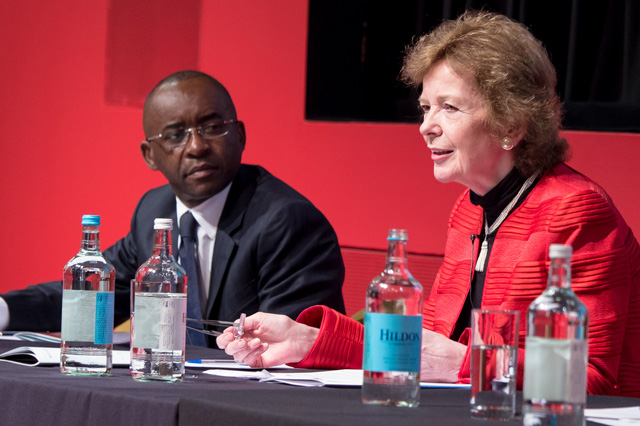Global governance and citizenship were among the issues discussed at a forum chaired by Mary Robinson in London on June 12.
Global governance and citizenship were among the issues discussed at a forum chaired by Mary Robinson in London on June 12.
Organised by Zamyn Global Citizenship, ‘Lessons for the G8’ was part of the ‘Cultural Forum 2013: Global Citizenship,’ a series of public lectures and debates taking place prior to the G8 Summit which will take place in Northern Ireland on 17 & 18 June. Panellists debated what G8 governments can do to foster wider cooperation and address the world’s most intractable problems. They explored the roles that business and non-governmental organisations can play, and – with less than a week to go to the G8 Summit – considered how G8 leaders can engage other countries as allies.
In comments throughout the discussion, Mrs Robinson raised the issue of how G8 governments can give leadership in a world moving rapidly from fossil-fuel-based, consumer-led growth to sustainable forms of energy.
The discussion comes after a recently released report by the International Energy Agency highlighted the key role the energy sector has in limiting climate change. The World Energy Outlook Special Report, ‘Redrawing the Energy-Climate Map’, stressed the need for the energy sector to adapt to the effects of climate change, and gave a clear warning that delaying stronger climate action to 2020 would come at a cost.
“I find it extraordinarily opportune that we have two huge agendas [the post-2015 development agenda and the 2015 global climate agreement] that have to be concluded by the end of 2015,” Mrs Robinson said, before calling for these agendas to be balanced and interconnected in their goals.
“If we don’t get a climate agreement by the end of 2015 we don’t know what the parameters of our world are to stay a safe world. And that’s not just vital for the poorer parts of the world that are already suffering climate shocks, but vital in an intergenerational way. We’re losing time to be able to influence and to be able to stay within the 2 degrees Celsius [intergovernmental target in limiting long-term rise in the average global temperature], which will still mean we’ll have more and more climate shocks, but they’ll be more or less manageable. If we go above that, then we’re into unchartered waters.”
The forum’s panellists comprised Sir Mark Moody-Stuart, chair of the Foundation for the Global Compact and former chairman of Anglo American and Shell; Paul Collier, co-director of the Centre for the Study of African Economies at the University of Oxford; Jamie Drummond, executive director and co-founder of the global advocacy organisation ONE; and Strive Masiyiwa, Zimbabwean businessman and a member of the Africa Progress Panel. The event closed with a reading by the Booker Prize-winning Nigerian novelist and poet Ben Okri.
Related Links:
IEA World Energy Outlook Special Report, ‘Redrawing the Energy-Climate Map’
Two-thirds of energy sector will have to be left undeveloped, Bonn conference told – Irish Times, 12 June 2013


